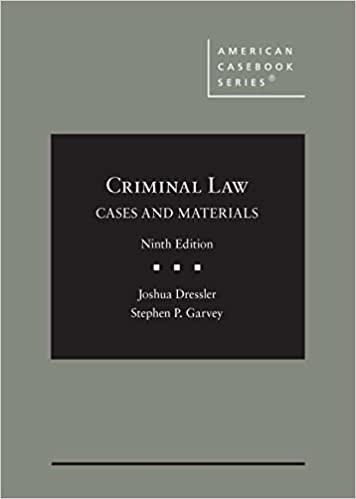Question
Assignment 5 1. (A) What is meant by mutual breach? (B) What is the effect of mutual breach on the obligations of each or both
Assignment 5
1. (A) What is meant by mutual breach?
(B) What is the effect of mutual breach on the obligations of each or both parties?
2. When does a debtor lose every right to make use of the period?
3. A borrowed P10K from B at 10 percent interest per year, payable on December 31, 2021.
(A) Can A require B to accept payment before December 31, 2021?
(B) Explain your answer.
Assignment 6
1.(A) When is an obligation divisible?
(B) When is an obligation indivisible?
2. (A) What is an obligation with a penal clause?
(B) Give an example.
3. How are obligations extinguished?
Assignment 7
1. (A) What is an alternative obligation?
(B) Give an example.
(C) In an alternative obligation, who has the right of choice?
(D) Why is the choice given to this party?
2. (A) What is a facultative obligation?
(B) Give an example.
3. (A) What is a joint and solidary obligation?
(B) What is the opposite of joint and solidary obligation?
Assignment 8
1. Give an example each of the following:
(A) Payment or Performance
(B) Loss of the thing due
(C) Condonation or Remission of the debt
(D) Confusion or Merger Of the rights of creditor and debtor
(E) Compensation
(F) Novation
Assignment 9
1. A owes B P10K. X, a friend of A, offered B payment of A's debt. B refused the payment. When A defaulted in paying the P10K he owed B on its due date, B sued A.
(A) Was B justified in refusing payment offered by X?
(B) Was B correct in suing A?
2. For payment to be valid, to whom shall it be made by the debtor?
3. Why does novation terminate an obligation?
Assignment 10
1. (A) What is the definition of contract?
(B) Distinguish a contract from an agreement.
(C) What kinds of stipulations, clauses, terms and conditions could contracting parties establish?
2. (A) What is meant by "privity of contract"?
(B) Give an illustration.
3. (A) How do you call contracts that are perfected mere consent? Give an example.
(B) What kind of contracts are perfected by the delivery of the thing subject matter of the contract? Give an example.
(C) What is the name of contracts that require compliance with certain prescribed formalities to be considered legal? Give an example.
Assignment 11
1. What are the requisites of a contract?
2. (A) Could a person, who is absent, enter into a contract, assuming he has the qualifications required by law?
(B) How?
3. (A) Who cannot give consent to a contract?
(B) Why?
Assignment 12
1. (A) Is a contract entered into by a person who is not able to read and write valid?
(B) Explain your answer.
2. Give the meaning of the following terms:
(A) "Violence" in a contract; that which defeats the element of consent.
(B) "Intimidation" in a contract; that which defeats the element of consent.
3.(A)What is meant by "fraud" in a contract?
(B) Give an example.
Assignment 13
1. The law says "All things which are not outside the commerce of men..., may be the object of a contract..."
(A) What is meant by "outside the commerce of men"?
(B) Give some examples.
2. Contract must have cause. The cause must be lawful.
(A) When is a cause in a contract unlawful?
(B) Give examples of unlawful causes.
3. In what form must a contract be, to be obligatory?
Assignment 14
1. (A) What is meant by "Reformation of Instruments"?
(B) When and how does "Reformation of Instrument" happen?
2. (A) What is the primary rule of interpretation in contracts?
(B) Give an example.
3. What are:
(A) Rescissible contracts?
(B) Voidable contracts?
(C) Unenforceable contracts?
(D) Void or inexistent contracts?
Assignment 15
1. (A)What are "Natural Obligations"?
(B) Give examples.
2. A owes B P10K. A dies. X, a friend of A's, paid B the P10K indebtedness. B accepted the payment.
(A) Was the payment valid?
(B) What kind of obligation was this, civil obligation or natural obligation?
3. A found a wallet with P10K, which B lost.
(A) Has B the right to recover the wallet and its contents from A?
(B) If A returns the wallet to B, can A demand a reward from B for returning it?
(C) Give an example of a natural obligation which could happen/ensue, in light of the facts given in this hypothetical case.
Step by Step Solution
There are 3 Steps involved in it
Step: 1

Get Instant Access to Expert-Tailored Solutions
See step-by-step solutions with expert insights and AI powered tools for academic success
Step: 2

Step: 3

Ace Your Homework with AI
Get the answers you need in no time with our AI-driven, step-by-step assistance
Get Started


